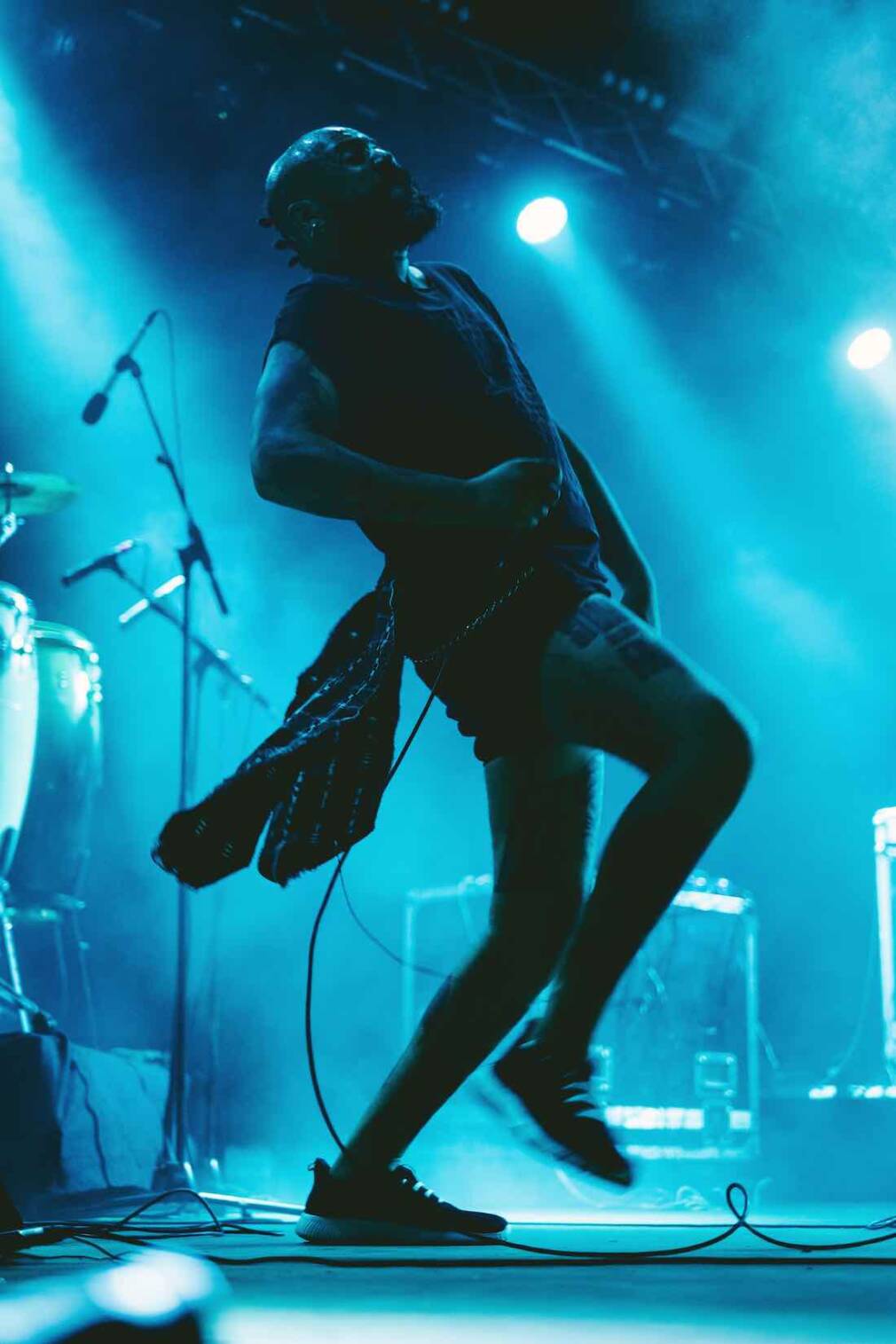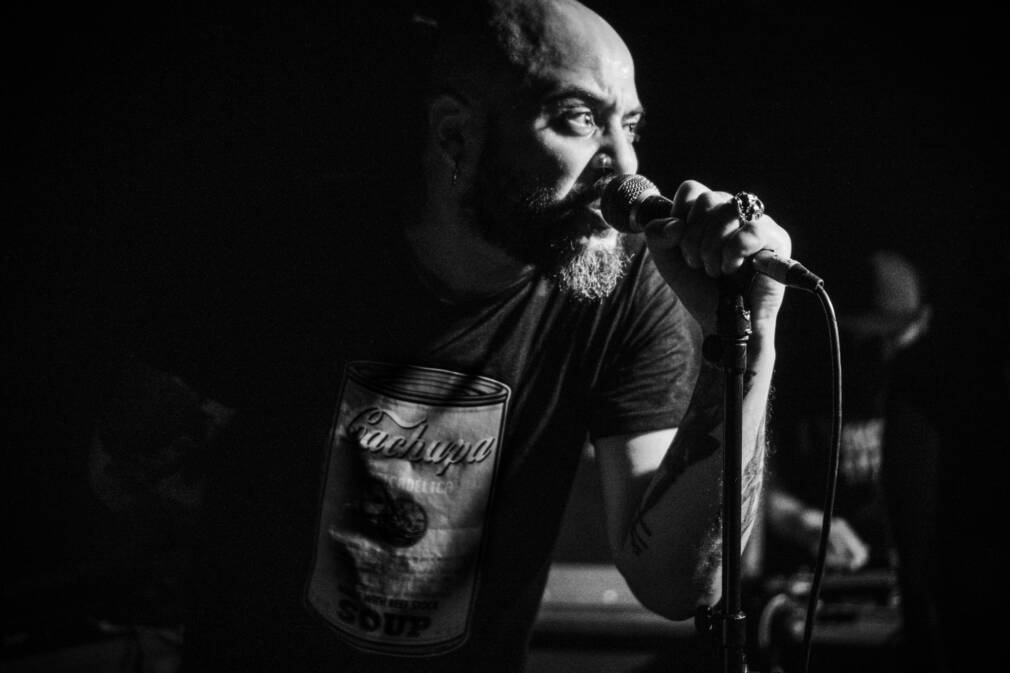Somewhere off the coast of Sao Tomé in the mid 1950s a steely frenetic sound spills over from the cargo ship’s bunkers. Fast and grating, an 18 year old Victor Tavares punched his labored hands into the keys of his most prized possession, an accordian, over a two month boat ride to his native Santiago, Cape Verde’s capital archipelago. Destined to become funaná legend, Victor aka Bitori was first met with harsh colonial oppression from fear of the rural sound’s subversive powers. Later, in 1997, the silver mustachioed musician went into the studio and recorded the, “best funaná album ever made.”
Fast forward to 2022 inside a chic hotel once again on the island of Santiago, in Cape Verde’s capital, Praia, with Sette Sujidade, aliás Marcus Veiga. Marcus is the singer and leader of Scúru Fitchádu (Créole for deep black) and wears his headbanging heart on his sleeve. His nose and ears are pierced, he sports a rivethead haircut and his black cutoff shirt and ripped jean shorts reveal a scattered series of zero-fucks-given tattoos. Over his shoulder, out past the window, the Cathedral Senhora da Graca glares white above the flamingo pink and sea green colonial buildings. Marcus was describing his funaná-punk sound. A distorted and guttural switch-up that plugs an urban edge into the accordion’s pastoral cry.

“To put distortion on the traditional stuff was not safe at the time,” Marcus shrugs with a bit of disappointment. “The most reluctant stuff that I encountered in this new (sound) was from Cape Verdean people.” Marcus looks outside past the beach-bay and towards Praia’s center. “For me this is personal. This is the biggest test of my career…It’s my first time in Cape Verde.”
Born in Portugal to first generation African parents, Marcus’ story isn’t unlike many diaspora kids from the 1980s. “My parents fled from war in Angola. My father was actually from Cape Verde, then immigrated to Angola, and met my mom. Then they went to Lisbon, Portugal. It’s like a regular second generation African living in Portugal. You’re too Portuguese to be Cape Verdean and you’re too Cape Verdean to be Portuguese.” In the identity wormhole Marcus pieced together his style from the Seattle alternative rock scene, UK punk and garage music before embracing Portuguese hip-hop as a fan and artist in the mid 90s. “And at home, I was listening to what my parents listened to. It was traditional music from the islands here in Cape Verde and from Angola also,” he adds.
Back to Bitori and his famous funaná. Unlike other Cape Verdean genres, funaná, also called gaita after the migrant workers who perfected the sound spending months abroad working to buy accordions, is a fast paced, 2-beat, generally monotonic style comparable to Trinidadian soca. It’s the uppity raucous cousin of Cesaria Evora’s poetic and melancholy morna and the popular counterpart to the ballroom dance of coladeira. It’s in this country’s “forbidden music” that Scúru Fitchádu anchors its equally rebellious sound.
“When you have someone that is talking about how much they work and not getting paid or maybe the father in the church is starting to go crazy, they don’t go with the flow of society so they made it forbidden,” Marcus says admiratively of the old school funaná. The same tone is embodied in tracks like “Manus Planus Danus” or “Brothers Plans Damages” off of Scúru Fitchádu’s 11-track debut album, Un Kuza Runhu. “It’s like, enough talking, let’s start pushing,” Marcus translates, “You’ve learned the books, let’s do some pushups.” It’s not an apology to violence but, as Marcus explains, a preemptive measure for uncertain times. Which is why the opening monologue fittingly comes from Huey P Newton, American revolutionary and founder of the Black Panther party. “I want to head bang. I want to crowd surf. I want to dance,” Marcus continues.
Later that night, a group of locals and some international insiders gather in front of a pop-up stage in Praia’s center for one of many shows in this year’s Atlantic Music Expo. The festival is a showcase of local talent for regional actors, but also a free live spectacle for locals to check-out artists from around the world. Old ladies sell their homemade grogue mixtures on the sidewalk and the city is layered with the smell of cachupa and fried fish.

The young and rowdy make their way to the front of the stage, a body of several hundred people await the show stirred by the island’s first June rain in over four years. The air continues to drizzle when Scúru Fitchádu takes the stage. A well-equipped drummer, synth player and fellow singer rip directly into their electro-funaná-punk universe. Marcus screams in Kriol, the drummer bangs with precision, the techno bassline builds, and Marcus’ savage co-lead stomps across the stage. They have the crowd’s full attention. Rolling through a series of hardcore cuts with some experimental dub detours, the public slowly lets loose enough to jump, dance and howl.
Then, Marcus drops the ferrinho, puts his tongue back in his mouth, stops his head banging to go grab his accordian. Wielding the big, heavy box in front of him, Marcus takes everyone for a ride back into the past. The chaotic fusion is now finely centered in the country’s funaná. Someplace, somehow, a chill runs up Bitori’s spine. Marcus finishes his riff and the crowd gives its full embrace. Young kids’ eyes are wide with excitement at this rebellious spectacle. The parents and grandmothers smile from further back. Cape Verde’s precious sound, once oppressed now expressed with headbanging freedom, is brought home imbued with industrial noise and new political power. Everyone claps and cheers.
“Scúru Fitchádu is an excuse for me to approach a little more and more my African heritage,” Marcus’ words coming back. “If I did other stuff, I’d miss something. In this I can bring everything.”
Un Kuza Runhu is out now.




